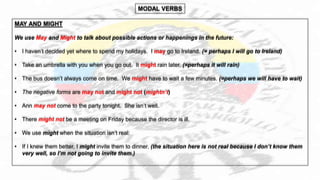
Modal verbs
- 1. MAY AND MIGHT We use May and Might to talk about possible actions or happenings in the future: • I haven’t decided yet where to spend my holidays. I may go to Ireland. (= perhaps I will go to Ireland) • Take an umbrella with you when you go out. It might rain later. (=perhaps it will rain) • The bus doesn’t always come on time. We might have to wait a few minutes. (=perhaps we will have to wait) • The negative forms are may not and might not (mightn’t) • Ann may not come to the party tonight. She isn’t well. • There might not be a meeting on Friday because the director is ill. • We use might when the situation isn’t real: • If I knew them better, I might invite them to dinner. (the situation here is not real because I don’t know them very well, so I’m not going to invite them.) MODAL VERBS
- 2. MUST We use must to say that we feel sure something is true: • You’ve been travelling all day. You must be tired. • Carol must get very bored in her job. She does the same thing every day. • I must pay my cell phone account today, or I will be in trouble. The negative of must is must not or mustn’t • You mustn’t say that bad words to me, it is awful!!! CAN We use can to say that something is possible or that somebody has the ability to do something: • We can see the lake from bedroom window • Can you speak any foreign languages? • I can come and see you tomorrow if you like • She can speak Spanish very well The negative is can’t or cannot: • I’m afraid I can’t come to the party on Friday night. • He can’t dance salsa music even though he was attending to some dance classes downtown.
- 3. Don’t forget that the simple past of CAN is COULD , but we use “could” specially with: See hear smell taste feel remember understand We also use “could” to say that somebody had the general ability or permission to do something: • My grandfather could speak five languages • We were completely free. We could do what we wanted. • The negative couldn’t (could not) is possible in all situations: Notice that modals verbs are the same for all the subject pronouns, they don’t change their ways, for example, You say: She can play the piano You don’t say: SHE CANS PLAY THE PIANO The same is for the rest of the modal verbs, they NEVER change with ANY subject pronouns • My uncle couldn’t swim. • We tried hard but we couldn’t persuade them to come with us. • Alf played well but he couldn’t beat Jack.